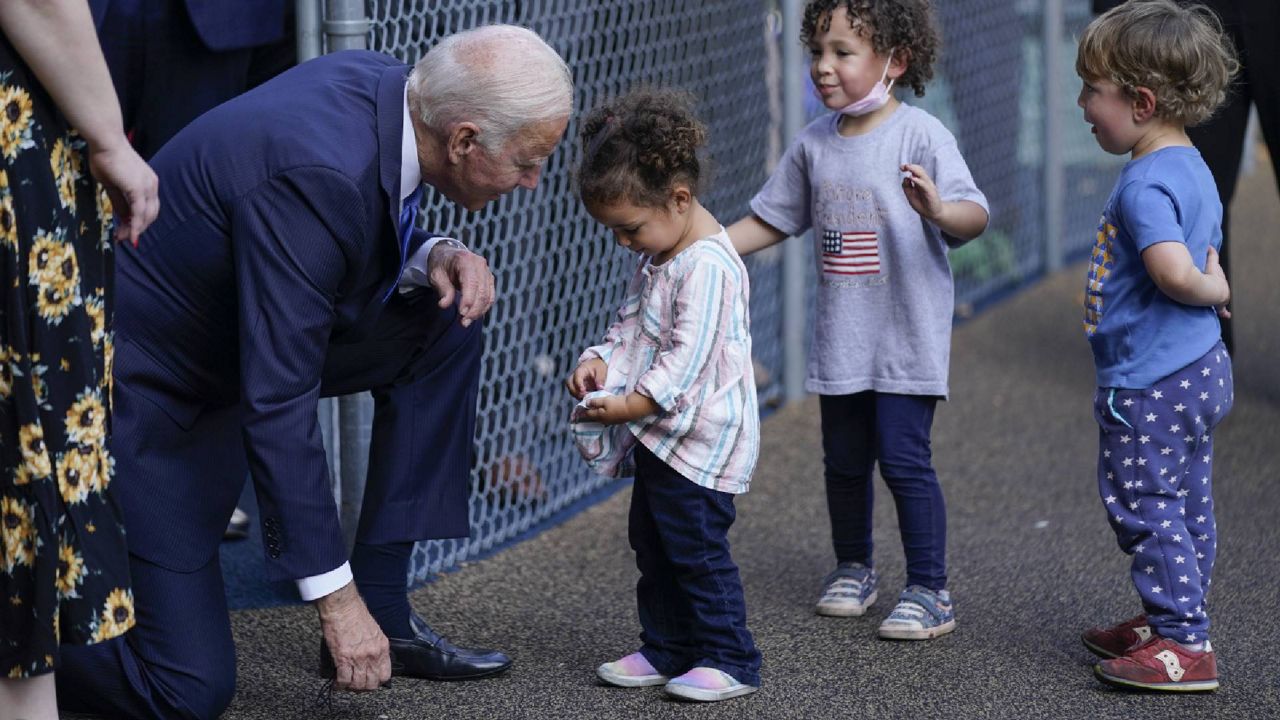President Joe Biden learned firsthand the value of child care, he said Friday, when his wife and young daughter died in a car accident, leaving him and his two sons on their own.
“I was making a decent salary as a U.S. senator: $42,000 a year,” he said, speaking at a child development center in Hartford. “And I could not afford the child care.”
“Everybody wonders why I commuted every day, 265 miles a day to be back and forth with my children,” he added of his daily trips between Washington, D.C., and Delaware. “I could afford the train. It was cheaper to be able to take every day so I could kiss my boys.”
The president reflected as he pitched his modern-day plan to include child care and other benefits for lower- and middle-class families in his sweeping social agenda, which is still pending in Washington.
His proposal would make such care free for lower-income families and ensure that families making up to 150% of their state’s median income pay less than 7% of their salaries on child care. The proposal is part of a massive expansion of the social safety net that Biden has championed and is aiming to pass with just Democratic votes in Congress.
President Biden on Friday spoke about a friend who helped him care for his sons, Beau and Hunter, after the accident, something he acknowledged was a privilege.
“But most people don't have that option. So I've been conscious of the concern in the lack of access for and the lack of financial ability to have child care for a long time,” he said.
His agenda, the president outlined, is not only about need at home but also the need to compete with the rest of the world.
“Somehow, along the way, we sort of stopped investing in our people,” President Biden said.
“Any country that out-educates us will out-compete us,” he explained, quoting his wife, Dr. Jill Biden. “These bills in my view are literally about competitiveness versus complacency.”
Biden’s plan also proposes universal pre-K for children around the U.S., one of his more popular ideas, and an extension of the child tax credit, of which another $15 billion in payments went out on Friday after the Biden administration expanded the benefit this year.
The U.S. ranks 35th out of 37 countries in public investment in young children, the president pointed out, and advanced countries spend an average of $14,000 per year for a toddler’s child care, compared with $500 in the United States.
President Biden on Friday also ticked through other elements of his agenda he’s hoping will pass to boost the economy, families and American competitiveness: The infrastructure bill stuck in Congress that will improve things like roads and bridges, funding to fight climate change, and his commitment to only raise taxes on wealthy Americans.
"A lot of folks know what's at stake in the infrastructure bill," Biden said of the Senate-passed $1 trillion plan. "It's about rebuilding the arteries of our economy. Putting people to work in good-paying jobs ... union jobs. Not $5 and hour, $7, $15, but $40-50 an hour, prevailing wage. You can raise a family on it, you can live with some dignity and pride. Bringing our roads and bridges up to speed, replacing lead water pipes. ... Laying transmission lines for a modern and resilient energy grid. Making high-speed internet affordable and available everywhere in America."
“When families have a little more breathing room, America has a lot better shot,” Biden said.
The president’s sales pitch comes as his Democratic allies have raised alarm that the American public does not understand the benefits of the package. There is renewed urgency among Democrats to push through the package ahead of an end-of-month deadline on transportation funding, Biden’s upcoming foreign trip, and a closer-than-anticipated race for Virginia’s next governor.
Talks between the White House and members of Congress continue, as they try to reach consensus both on the total spending level for the legislation and what particular programs should be included. Objections by centrist Sens. Joe Manchin and Kyrsten Sinema are forcing Democrats to shrink the package from Biden’s proposed $3.5 trillion to closer to $2 trillion.
“We're not going to get $3.5 trillion. We'll get less than that, but we're gonna get it,” President Biden conceded Friday. “And we're gonna come back and get the rest.”
The fate of that legislation, branded “Build Back Better” by Biden, is also holding up a more than $1 trillion bipartisan infrastructure bill that passed the Senate this summer. House progressives are balking at supporting that bill until agreement is reached on a path forward on the social safety net package.
Biden was also scheduled to deliver remarks Friday at the dedication of the Dodd Center for Human Rights at the University of Connecticut, which is being renamed to honor a longtime friend, former Connecticut Sen. Chris Dodd, in addition to Dodd’s father, who was also a former senator.



